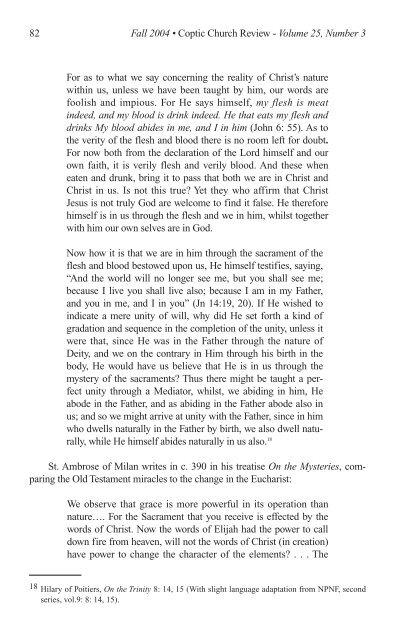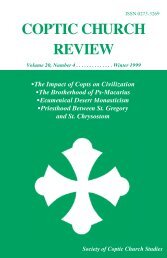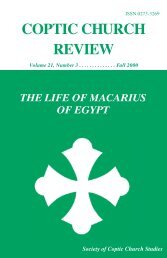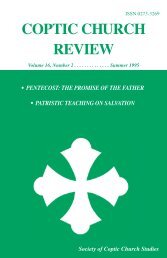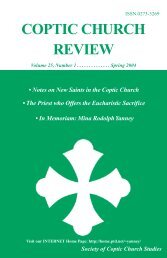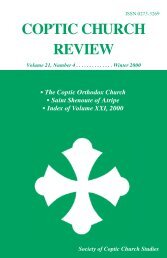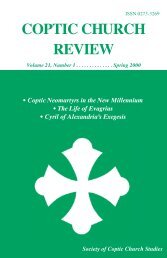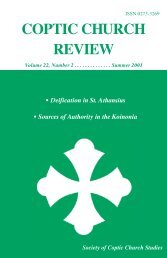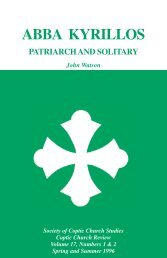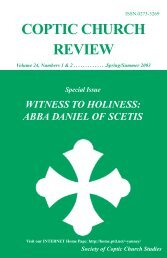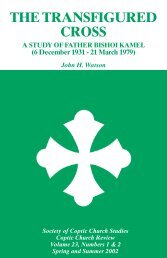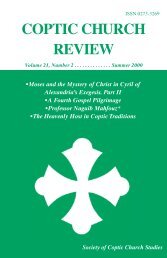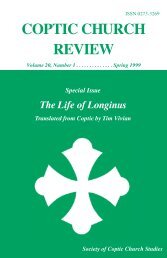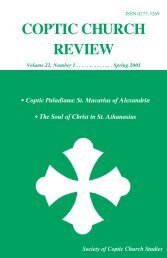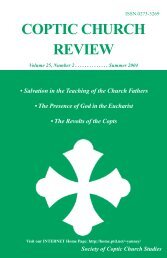2004 Fall.Vol25.#3.pdf - Coptic Church Review
2004 Fall.Vol25.#3.pdf - Coptic Church Review
2004 Fall.Vol25.#3.pdf - Coptic Church Review
Create successful ePaper yourself
Turn your PDF publications into a flip-book with our unique Google optimized e-Paper software.
82 <strong>Fall</strong> <strong>2004</strong> • <strong>Coptic</strong> <strong>Church</strong> <strong>Review</strong> - Volume 25, Number 3<br />
For as to what we say concerning the reality of Christ’s nature<br />
within us, unless we have been taught by him, our words are<br />
foolish and impious. For He says himself, my flesh is meat<br />
indeed, and my blood is drink indeed. He that eats my flesh and<br />
drinks My blood abides in me, and I in him (John 6: 55). As to<br />
the verity of the flesh and blood there is no room left for doubt.<br />
For now both from the declaration of the Lord himself and our<br />
own faith, it is verily flesh and verily blood. And these when<br />
eaten and drunk, bring it to pass that both we are in Christ and<br />
Christ in us. Is not this true? Yet they who affirm that Christ<br />
Jesus is not truly God are welcome to find it false. He therefore<br />
himself is in us through the flesh and we in him, whilst together<br />
with him our own selves are in God.<br />
Now how it is that we are in him through the sacrament of the<br />
flesh and blood bestowed upon us, He himself testifies, saying,<br />
“And the world will no longer see me, but you shall see me;<br />
because I live you shall live also; because I am in my Father,<br />
and you in me, and I in you” (Jn 14:19, 20). If He wished to<br />
indicate a mere unity of will, why did He set forth a kind of<br />
gradation and sequence in the completion of the unity, unless it<br />
were that, since He was in the Father through the nature of<br />
Deity, and we on the contrary in Him through his birth in the<br />
body, He would have us believe that He is in us through the<br />
mystery of the sacraments? Thus there might be taught a perfect<br />
unity through a Mediator, whilst, we abiding in him, He<br />
abode in the Father, and as abiding in the Father abode also in<br />
us; and so we might arrive at unity with the Father, since in him<br />
who dwells naturally in the Father by birth, we also dwell naturally,<br />
while He himself abides naturally in us also. 18<br />
St. Ambrose of Milan writes in c. 390 in his treatise On the Mysteries, comparing<br />
the Old Testament miracles to the change in the Eucharist:<br />
We observe that grace is more powerful in its operation than<br />
nature…. For the Sacrament that you receive is effected by the<br />
words of Christ. Now the words of Elijah had the power to call<br />
down fire from heaven, will not the words of Christ (in creation)<br />
have power to change the character of the elements? . . . The<br />
18 Hilary of Poitiers, On the Trinity 8: 14, 15 (With slight language adaptation from NPNF, second<br />
series, vol.9: 8: 14, 15).


